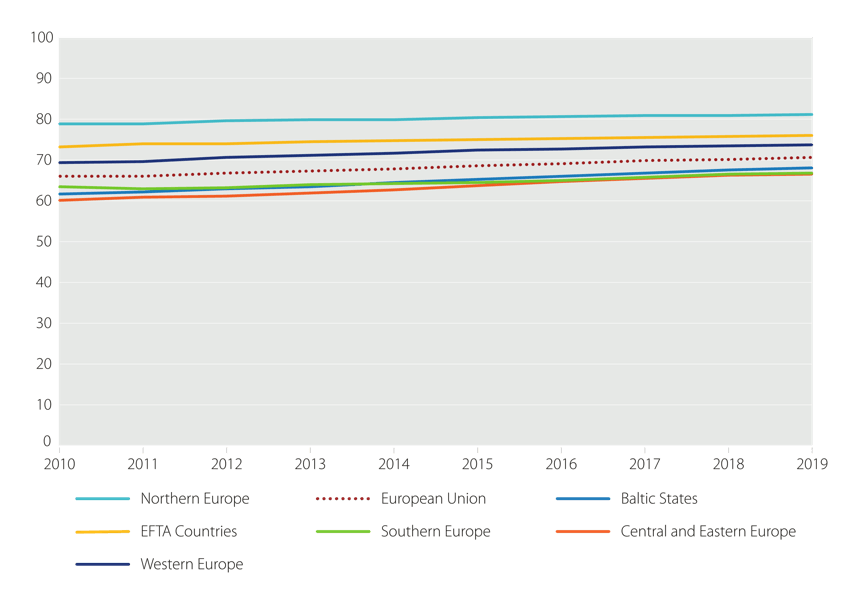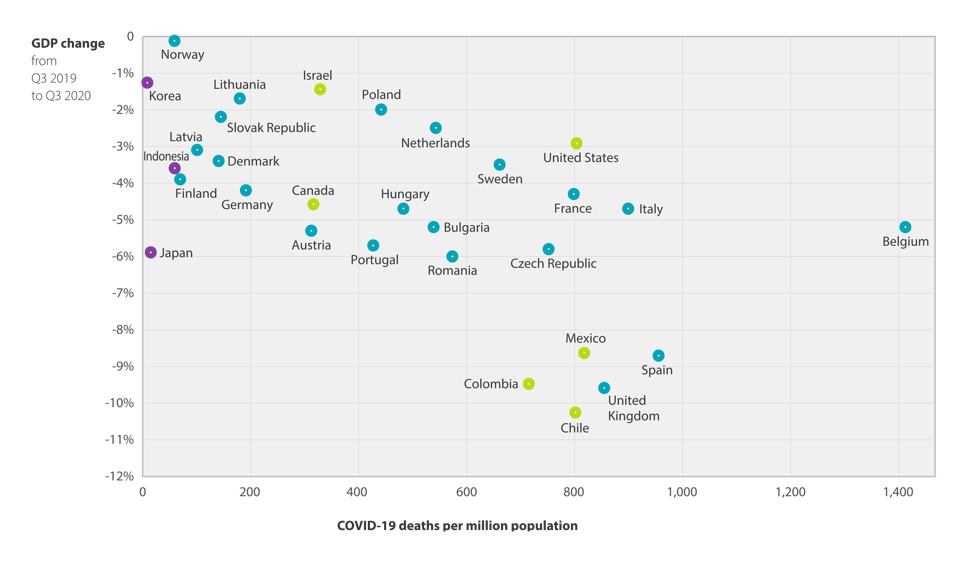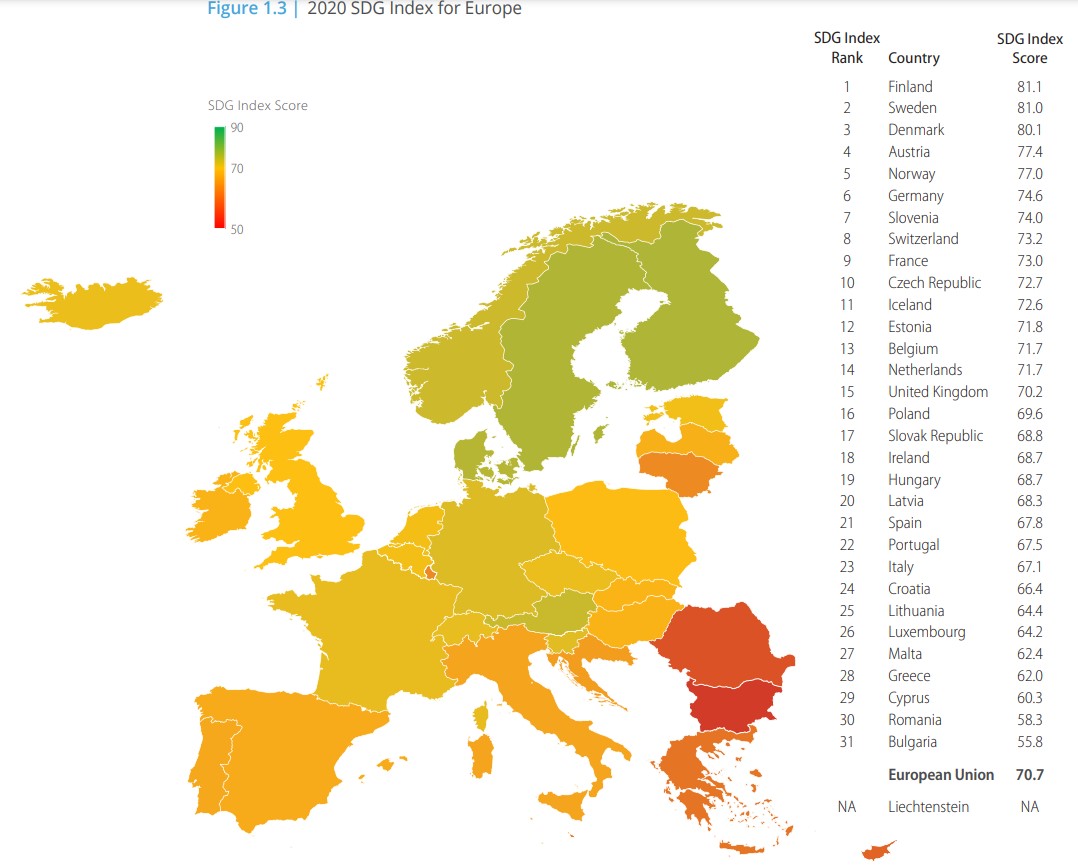The Sustainable Development Solutions Network (SDSN) and the Institute for European Environmental Policy (IEEP) published the Europe Sustainable Development Report 2020, the second independent quantitative report on the progress of the European Union, its member states, and other European countries towards the Sustainable Development Goals (SDGs), agreed by all UN member states in 2015.
The Europe Sustainable Development Report 2020 is part of the broader Sustainable Development Report (SDR) series which track the performance of countries and municipalities around the world on the SDGs since 2015. It builds on a peer-reviewed and statistically audited methodology, and includes country profiles for the EU, its member states and partner countries.
The report comes at a critical time when a new US administration has committed to re-joining the Paris Agreement. China, Japan, South Korea, and other countries have joined the EU in pledging zero greenhouse gas emissions by around the middle of the century. This is the time for the EU to promote shared goals for sustainable development ahead of landmark 2021 climate and biodiversity summits in the United Kingdom and in China.
Guido Schmidt-Traub, Executive Director of the SDSN, states that, “The SDGs and the Paris Agreement reflect Europe’s values and are aligned with the European Green Deal, so the EU must provide global leadership on the goals. The EU has the tools in place to achieve the SDGs internally, but they must be organized more clearly around the six transformations. It is in the EU’s interest to promote SDG and Green Deal diplomacy ahead of the climate and biodiversity COPs in 2021.”
At the same time, Europe’s recovery from the COVID-19 pandemic must advance long-term development objectives. “Political attention rightfully remains in many European countries geared towards responding to the public health crisis caused by the COVID-19 pandemic. Yet, recent good news on vaccines’ developments make recovery in 2021 increasingly likely. This report shows how the SDGs provide a roadmap for a sustainable and inclusive recovery,” says Guillaume Lafortune, Director of SDSN Paris.
In this process, strengthening SDG data and statistics and monitoring processes will be key. Céline Charveriat, Executive Director at IEEP adds that “In the midst of the COVID 19 pandemic, measuring the progress towards SDGs with the right indicators is essential to ensuring a just, green and resilient recovery.”
SDG Transformations can support a sustainable and fair recovery.
Even before the onset of the pandemic, no European country was on track to achieve all 17 SDGs by 2030. Overall, Nordic countries perform best on the SDG Index, one of the key features included in the report. Finland tops the 2020 Europe SDG Index followed by Sweden and Denmark, but even these countries face major challenges on several SDGs. Europe faces its greatest SDG challenges in the areas of sustainable agriculture and diets, climate, and biodiversity – and in strengthening the convergence of living standards across its countries and regions.
Progress on the SDG Index by Europe sub-regions (2010-2019)

Source: SDSN and IEEP, 2020.
The recovery should aim to make the EU more sustainable, inclusive and resilient based on the European Green Deal and addressing all 17 SDGs. The crisis calls for a recovery driven by transformative public investments that support green infrastructure, digitization, and responsible consumption and production. This must be accompanied with increased efforts and investments to boost education and skills throughout Europe and to accelerate the convergence of living standards. Coordinated efforts to reform tax systems, and in particular digital taxes, are crucial to finance these transformations in Europe and in the rest of the world.
Xi Jinping’s pledge to achieve carbon neutrality before 2060 in China; similar recent commitments by Japan and South Korea; and the election of Joe Biden to the US presidency have all profoundly changed the international landscape for EU diplomacy, offering a window for increased multilateral and bilateral Green Deal diplomacy.
Operationalising the SDGs in the EU
Many proposed and existing EU policies aim to achieve the 2030 Agenda, even though they may not be explicitly framed in terms of these internationally-agreed goals. While there is no need to launch a new EU-wide SDG strategy process, there is a pressing need to maintain strong political commitment to the Goals, to track progress, and to communicate (to Europeans and others) how the EU and Member States are working to achieve them.
The COVID-19 pandemic, along with unprecedented pressures on multilateralism and a rules-based international order, threatens the visibility and viability of the SDGs as the world’s shared goals for sustainable development. As an overriding priority, the three pillars of EU governance – the European Council, the European Parliament, and the European Commission – should issue a shared political commitment to the 2030 Agenda and to the 17 Goals.
The report further explores the role of six major policy levers and tools that are particularly critical for implementing the SDG Transformations in the EU and to support SDG progress in other countries:
- A New European Industrial and Innovation Strategy for the SDGs
- An investment plan and financing strategy aligned with the SDGs
- Coherent national and EU SDG policies – the SDG-based European Semester
- Coordinated Green Deal / SDG Diplomacy
- Regulations on business standards and reporting
- SDG monitoring and reporting framework
Europe needs to learn from the pandemic and strengthen health systems’ preparedness, prevention, and resilience to achieve SDG3 (Good Health and Well-Being)
Compared with countries in the Asia-Pacific region, European responses to the COVID-19 pandemic have generally been far less effective in controlling and suppressing the pandemic, resulting in “stop & go” confinement measures and reductions in many economic activities. A comparison between GDP growth in the third quarter of 2020 compared with the third quarter of 2019 and COVID-19 deaths per million population in 2020 highlights the relatively good performance of countries like South Korea compared with European countries in mitigating both the health and the economic consequences of the COVID-19 pandemic. In Europe, Finland and Norway managed best to mitigate the health and economic impacts from the pandemic so far. Belgium, Spain and the United Kingdom have experienced the most severe health and economic impacts from the pandemic.
Countries that opted for a more liberal rhetoric to manage the pandemic, such as Sweden in Europe, as well as the United States, have not performed particularly well economically and have had among the highest death rates from COVID-19 so far.
Learning from countries that have succeeded in suppressing the virus and have better managed to mitigate its health and economic impacts will be key to achieving SDG target 3.d on preparedness for global health security issues. Greater preparedness, coordination and resilience are also needed to prepare Europe for other public health and environmental threats, including climate risks.
COVID-19 Deaths and GDP Growth in Q3, 2020

Unsustainable supply chains and trade-related spillovers from the EU undermine other countries’ capacities to achieve the SDGs and increase the likelihood of future pandemics
The 2020 International Spillover Index, included in the report, shows that European countries are generating large, negative spillovers outside the region – with serious environmental, social and economic consequences for the rest of the world. For instance, imports of textile products into the EU are related to 375 fatal workplace accidents (and 21,000 non-fatal accidents) every year. Unsustainable supply chains also lead to deforestation and increased biodiversity threats.
To ensure international legitimacy, the EU must address negative international spillovers. This will require coherent trade and external policies through Green Deal Diplomacy, strengthened tax cooperation and transparency, the application of EU standards to exports, and curbing trade in waste. Moreover, the EU needs to systematically track such spillovers and assess the impact of European policies on other countries and the global commons.



